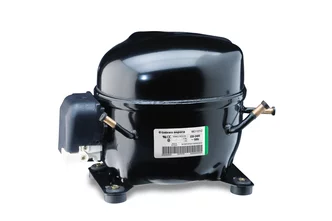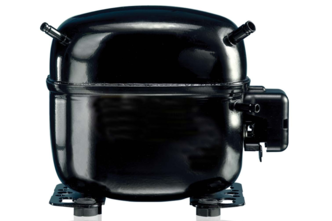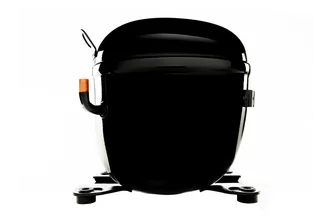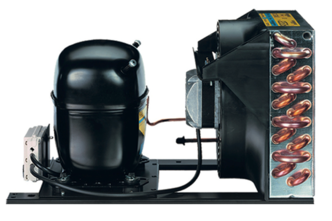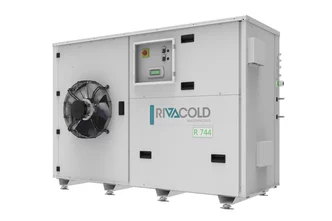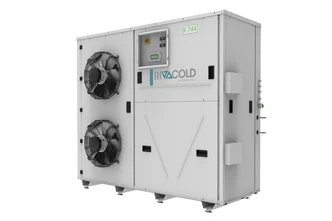SCHIESSL is ready for propane (R290)
Welcome to the future of refrigeration technology: propane (R290) as a natural refrigerant.
Propane is an innovative refrigerant that combines environmental friendliness, energy efficiency and sustainability. We would like to introduce you to this refrigerant in more detail and explain the differences to other common refrigerants. As an experienced wholesaler, we will be happy to answer your questions and help you to implement your projects safely and successfully with R290.
On this page you can find out everything you need to know about the refrigerant R290, from its benefits to its areas of application.
Why propane refrigerant?
The refrigerant R290 is a forward-looking and environmentally friendly option for refrigeration and air conditioning systems. It is characterized by several advantages:
- Environmental friendliness: propane is an environmentally friendly refrigerant that does not damage the ozone layer and causes only minimal warming of the atmosphere. By using propane (R290) as a refrigerant, we are making an active contribution to environmental protection.
- Energy efficiency: Propane is extremely efficient and enables considerable energy savings thanks to its excellent thermodynamic properties. This reduces your operating costs and improves your environmental footprint.
- Versatility: Propane can be used as a refrigerant in a wide range of systems. From air conditioning using chillers and heating using heat pumps to food refrigeration. The refrigerant propane is extremely efficient even at high outside temperatures and is therefore ideal for use in many industries.
Our propane product range
Discover our wide range of high-quality R290-powered compressors, condensing units, chillers and refrigeration components.
Semi-hermetic Compressors
Fully hermetic compressors
Condensing units
Chillers
Ready for R290 (propane)?
We look forward to advising you about R290 and our wide range of services in the area of propane (R290) systems. Whether you are interested in our products, planning or installation, we are here for you. Become an expert in propane systems with Schiessl!
Propane (R290): Questions and answers about the refrigerant and its properties
Is propane (R290) an environmentally friendly refrigerant?
Propane (R290) is a natural refrigerant that has a low environmental impact. It has a very low global warming potential (GWP) of 3 and no ozone depletion potential (ODP). It is also more energy efficient than other refrigerants. Propane (R290) is used as an environmentally friendly alternative to synthetic refrigerants such as R134a or R410a, which have a high impact on climate change.
Is propane (R290) refrigerant sustainable?
Propane (R290) is a natural refrigerant consisting of a gas that occurs in nature. It has very good thermodynamic properties, which make it particularly suitable for heat pumps. It can reach high flow temperatures and requires only a small charge. It has a very low GWP value of 3, which means that it hardly contributes to global warming. It contains no harmful chemicals such as PFAS or CFCs. R290 is therefore a sustainable refrigerant for heat pumps, air conditioning systems and commercial refrigeration.
Is propane (R290) an alternative to F-gases?
Propane (R290) is a naturally occurring refrigerant that has a low environmental impact and is therefore being considered as an alternative to F-gases. F-gases are fluorinated greenhouse gases that contribute significantly to climate change.
What are the advantages of propane (R290) as a refrigerant?
Propane (R290) is a natural refrigerant consisting of the elements carbon and hydrogen. It has several advantages as a refrigerant, such as
- It has a very low GWP (Global Warming Potential) value of 3, which means that it hardly contributes to global warming.
- It has favorable thermodynamic properties that enable high energy efficiency and good heat transfer.
- It is a pure gas that does not need to be mixed with other chemical compounds, as is the case with synthetic refrigerants.
- It is not affected by the provisions of the F-Gas Regulation, which completely bans the use of all synthetic refrigerants from 2050.
How good is the availability of propane (R290)?
The availability of propane (R290) is good in most countries, as it can be obtained from natural gas or crude oil.
Is propane (R290) safe?
Propane is highly flammable and can cause fires or explosions if not handled or stored properly. It is therefore important to observe a number of safety measures when handling propane.
What safety measures are necessary when handling propane (R290)?
The safety measures include:
- Only store and transport propane in approved containers
- Do not use or store propane near sources of ignition, open flames or sparks
- Do not use or store propane in enclosed or poorly ventilated areas
- Do not overheat propane or expose it to overpressure
- Do not mix propane with other flammable or oxidizing substances
- Do not inhale propane or allow it to come into contact with skin or eyes
- Have propane installed, maintained and repaired by qualified personnel only
- Report propane leaks immediately and shut down the affected system
- In the event of a fire or explosion, alert the fire department and evacuate the area
How efficient is propane (R290) as a refrigerant compared to other refrigerants?
R290 has a high energy efficiency and enables good heat transfer. It is therefore well suited for use in heat pumps, chillers and commercial refrigeration. Propane (R290) has a low boiling temperature, a small volume in the vaporized state and a low condensing pressure.
Why is propane (R290) used as a refrigerant in commercial refrigeration solutions?
Propane (R290) is a natural refrigerant used in commercial refrigeration solutions to reduce the environmental impact of synthetic refrigerants. Propane has a high thermodynamic efficiency, a low charge and a low global warming potential. It is also more cost-effective than other refrigerants when used in accordance with current regulations and standards. Propane is mainly used in small to medium refrigeration applications such as supermarket coolers, vending machines, cold rooms and heat pumps.
In which systems can propane (R290) be used?
Applications that are suitable for propane include:
- Domestic refrigeration appliances such as fridges and freezers
- Commercial refrigeration appliances such as refrigerated counters, cold rooms and ice machines Industrial refrigeration systems for food processing, storage and transportation
- Air conditioning systems for buildings, vehicles and ships
- Heat pumps for heating and hot water
Propane can be used in both hermetic and semi-hermetic compressors. It is compatible with common materials and lubricants in refrigeration systems. It has a low filling quantity and low pressure, which reduces system costs.
How is the efficiency of propane (R290) affected at different ambient temperatures?
The efficiency of propane (R290) is influenced by various factors, including the ambient temperature. Propane can reach high temperatures even at very low ambient temperatures (down to -15°C) and has a wide operating range from -40°C to +15°C evaporating temperature.
Does propane (R290) as a refrigerant meet the objectives of the F-Gas Regulation?
Propane (R290) is a natural refrigerant and therefore not an F-gas. It therefore meets the objectives of the F-Gas Regulation. The F-Gas Regulation aims to reduce emissions of fluorinated greenhouse gases that contribute to climate change. Propane has a very low global warming potential (GWP) of 3 and a short atmospheric lifetime of less than one year. Propane is also energy efficient, cost effective and safe when used in accordance with applicable standards and regulations. Propane is therefore a sustainable and future-proof alternative to synthetic refrigerants with a high GWP.
Is propane (R290) toxic?
Propane is not toxic, but it is flammable and therefore requires special safety measures when installing and maintaining systems.
Do I need my own training to work with propane (R290)?
The basic and advanced training of mechatronics engineers for refrigeration technology and master craftsmen includes the handling of A3 refrigerants, which includes propane. Employees must also receive safety training in order to work with these refrigerants.
Can propane (R290) also be used as a refrigerant in the air conditioning sector?
Areas of application include areas such as:
- Mobile air conditioning systems
- Monobloc heat pumps
- Split air conditioning systems (mono)
- Chillers for outdoor installation
What is the difference between LPG and propane gas?
"LPG" is a general term that refers to gases that exist in liquid form at normal temperatures and pressures. There are different types of liquefied gases, and "propane gas" is a specific type of liquefied gas.
Propane gas consists mainly of propane, a hydrocarbon gas with the chemical formula C3H8. It is a colorless and odorless gas that is gaseous at room temperature and normal pressure. However, when pressurized or cooled, it becomes a liquid form that can be used as a liquefied gas.
The main difference between the terms therefore lies in the specificity. LPG is a general term for gases in liquid form, while propane gas is a specific type of liquefied gas consisting mainly of propane. It is important to note that there are also other liquefied gases, such as butane or a mixture of propane and butane.
What is the difference between butane and propane gas?
Butane and propane gas are both types of liquefied gases that are often used for different purposes. Here are the main differences between butane and propane gas:
1. chemical structure: propane gas is mainly composed of propane (C3H8). Butane gas consists mainly of butane (C4H10).
2. boiling point and physical state: propane gas boils at -42 degrees Celsius and is in gaseous form at room temperature and normal pressure. Butane gas: boils at around 0 degrees Celsius and is in gaseous form at room temperature and normal pressure.
Both gases have similar properties, but due to their different boiling points and applications, they are often used in different contexts. It is important to note that there are also mixtures of propane gas and butane gas, known as propane-butane mixtures or LPG (Liquefied Petroleum Gas).






